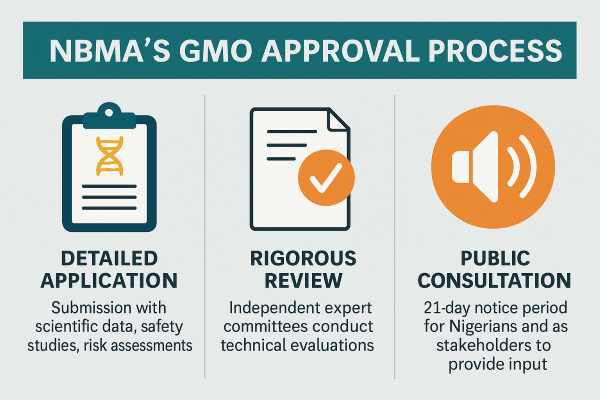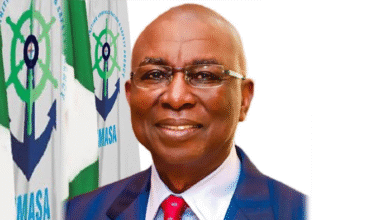Food Sovereignty at Stake: Why NBMA Is Cracking Down on GMO Imports

Nigeria’s biosafety regulator is drawing a hard line in the sand. The National Biosafety Management Agency (NBMA) has reaffirmed that no Genetically Modified Organism (GMO) will enter or be used in the country without passing through one of the most stringent approval processes in the world. For violators, the message is clear: expect sanctions.
The renewed stance comes amid heated debates on GMO seeds and foods in Nigeria, with farmers, consumer rights advocates, and policy analysts questioning their long-term impact on food security, biodiversity, and health.
NBMA’s Guardrails on GMOs
Speaking in Abuja, Gloria Ogbaki, NBMA’s Head of Information and Public Relations, stressed that the agency’s mandate is rooted in science, transparency, and the protection of Nigeria’s environment and people.
“No GMO enters or is used in Nigeria without passing through the Agency’s strict, science-based approval process. Any importer or producer found to contravene the NBMA Act will face appropriate sanctions,” Ogbaki said.
Established under the NBMA Act of 2015 (amended 2019), the agency regulates the safe use of modern biotechnology. Every GMO application is required to include scientific data, safety studies, and risk assessments. These are subjected to rigorous reviews by the National Biosafety Committee and Technical Sub-Committee—teams of molecular biologists, toxicologists, nutritionists, and environmental scientists.
In line with its transparency mandate, each application is published in two national newspapers and made available for public review for 21 days, allowing Nigerians to raise concerns before approval is considered.
Why This Matters: Trust, Transparency, and Trade
Nigeria’s agricultural system is under enormous pressure: food inflation is above 30%, imports are draining scarce forex, and productivity gaps remain wide. Proponents of GMOs argue they can boost yields and resilience. Critics warn of health risks, loss of indigenous seed sovereignty, and long-term environmental damage.
NBMA insists it is not anti-innovation but pro-safety. Approvals are granted only if a GMO is proven to be as safe as its conventional counterpart. Even then, licences come with strict conditions, post-release monitoring, and quarterly surveillance. Breaches attract seizure, destruction, or repatriation of products.
This framework is aligned with global benchmarks, including FAO standards, Codex Alimentarius, and the Cartagena Protocol on Biosafety. Importantly, Nigeria mandates GMO labelling—protecting consumer rights to choose.
The Outcry: Why Nigerians Remain Wary
Despite NBMA’s assurances, public resistance remains strong. Farmer groups fear dependency on foreign seed giants. Nutrition activists raise concerns about allergenicity and long-term health effects. Some see GMOs as a Trojan horse that undermines Nigeria’s food sovereignty.
The stakes are high: Nigeria is Africa’s largest consumer market, and any shift in food systems has regional ripple effects.
BRANDECONOMY Analysis: Beyond Science, a Governance Test
NBMA’s crackdown is not just about science—it’s about governance and public trust. With global agribusiness giants eager to enter, and Nigeria’s food crisis deepening, the regulator is under pressure to strike a balance between innovation and sovereignty.
The agency’s credibility will depend on three factors:
- Transparency – ensuring public consultations are not tokenistic.
- Enforcement – prosecuting violators, not just warning them.
- Education – engaging farmers and consumers with clear information, not technical jargon.
If NBMA can maintain this balance, it could set a continental benchmark for biosafety regulation.
BRANDECONOMY Takeaway
Food sovereignty is too critical to be outsourced. Nigeria’s future food system must be innovative, but it must also remain safe, transparent, and firmly in Nigerian hands. The NBMA’s hard stance is a reminder that biosafety is not just a technical issue—it is a national security and economic sovereignty issue.











